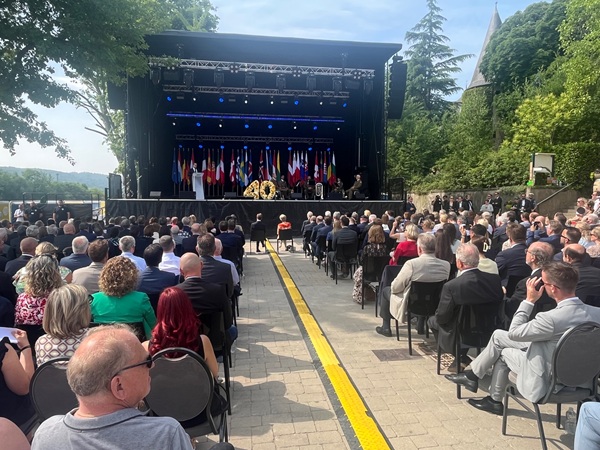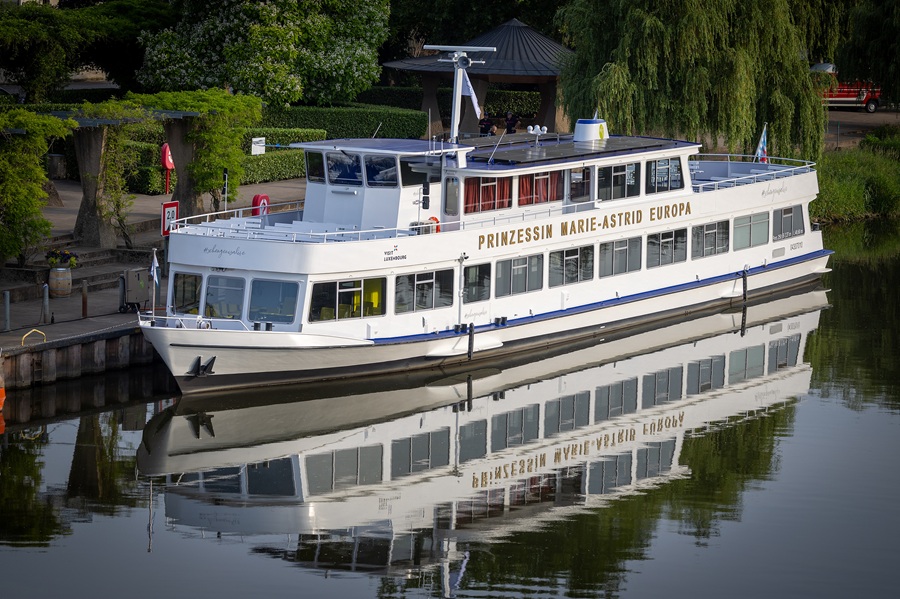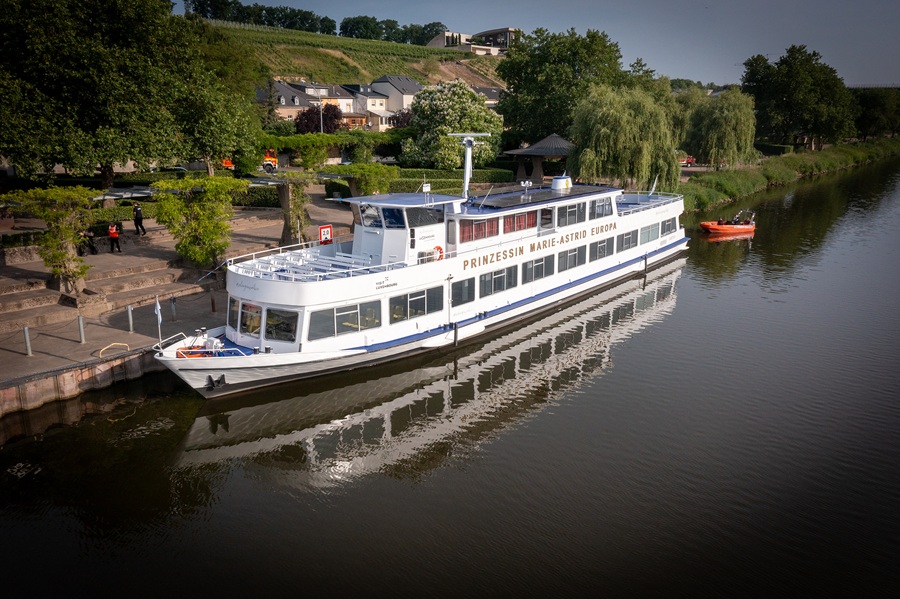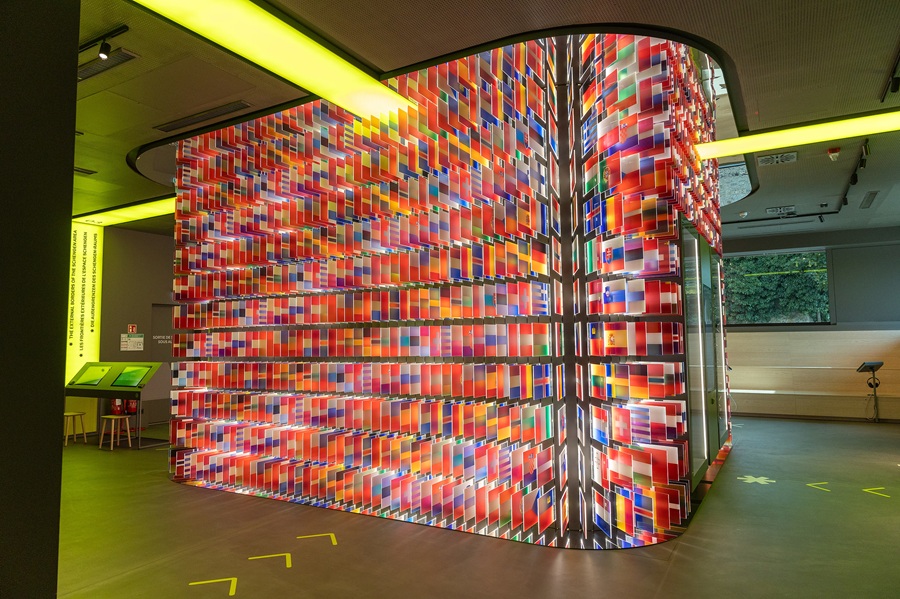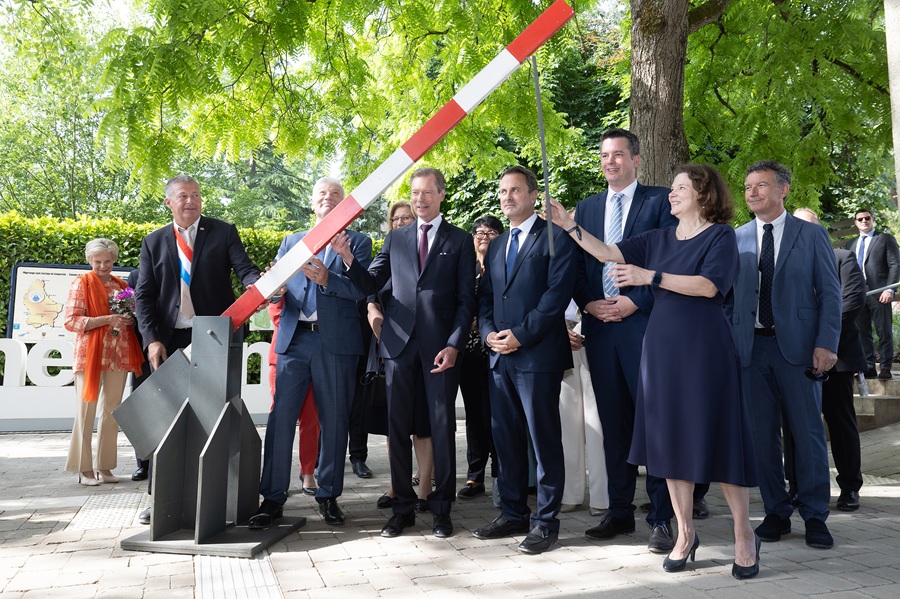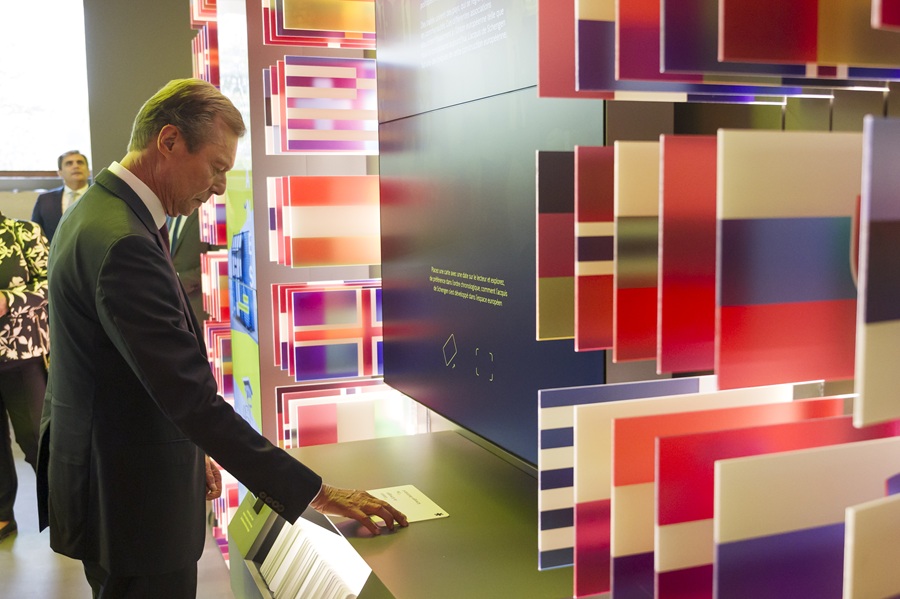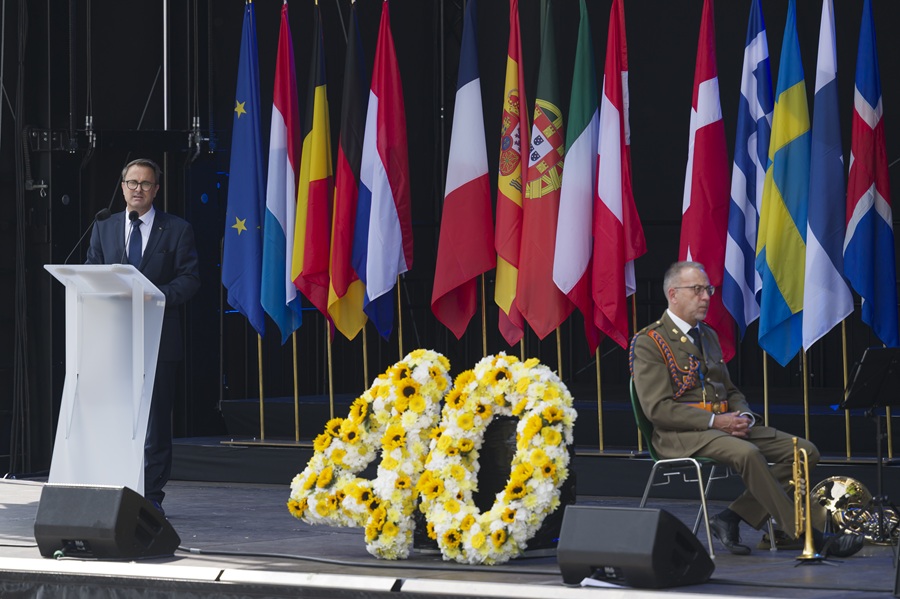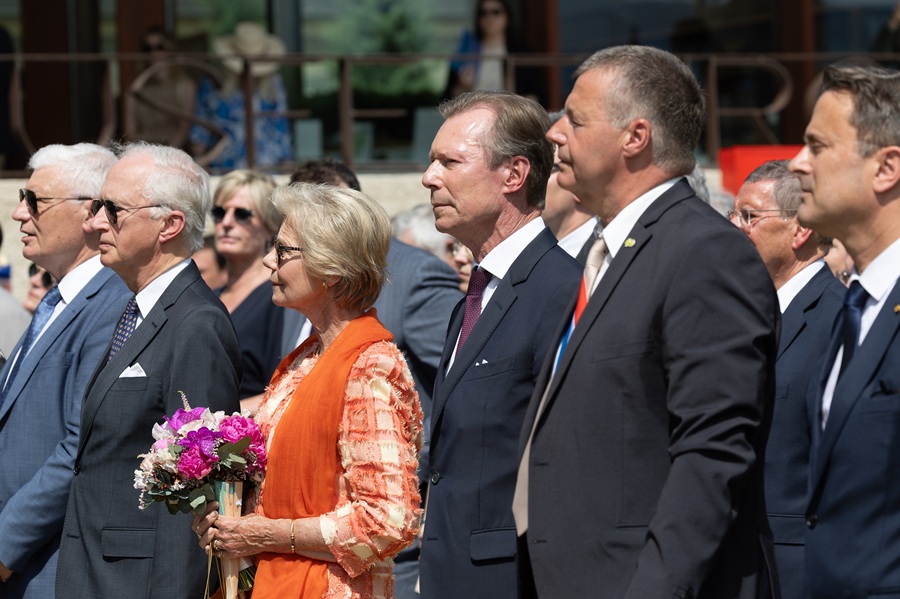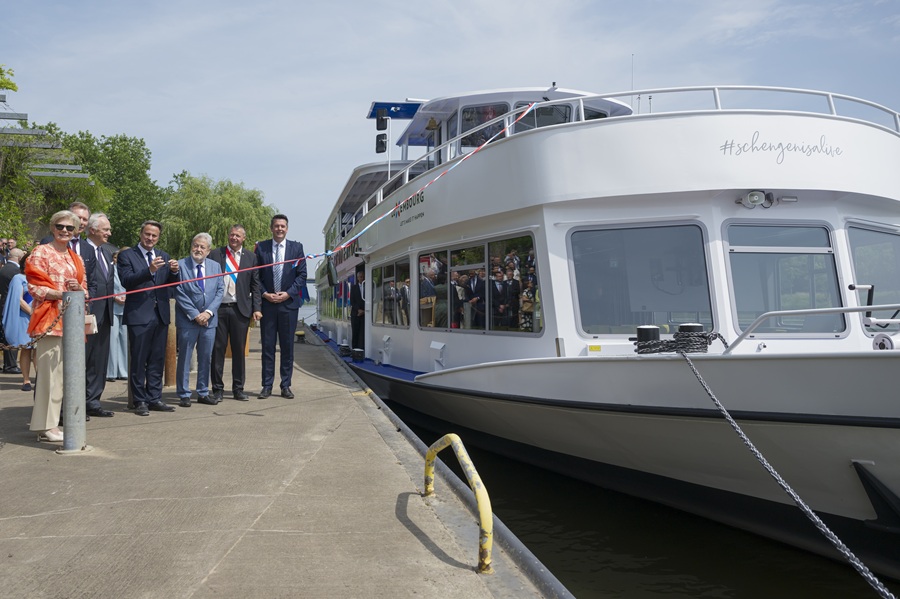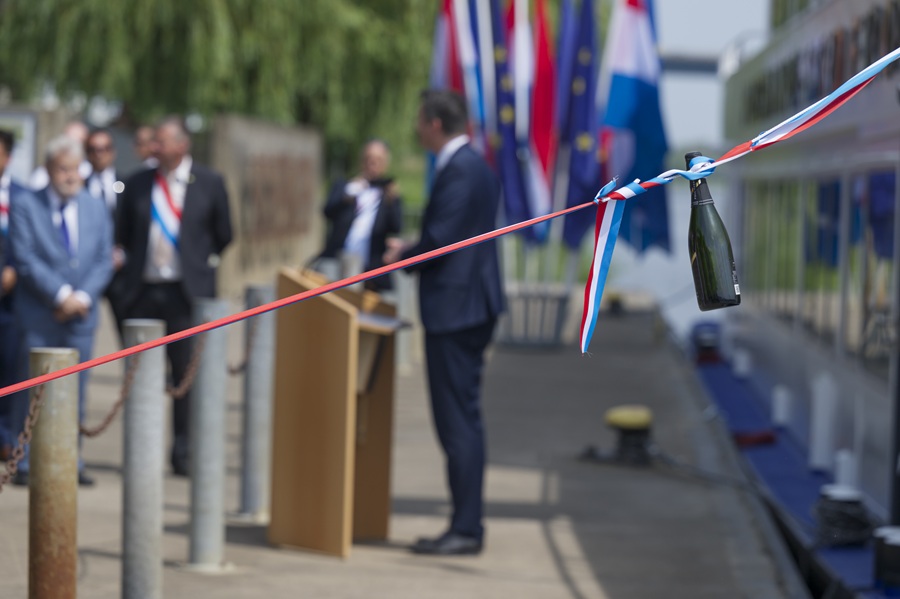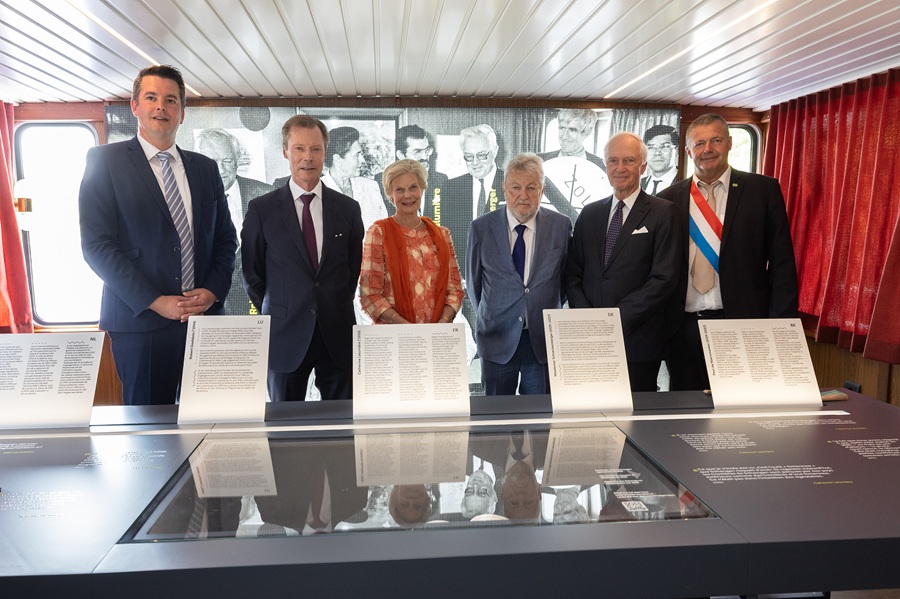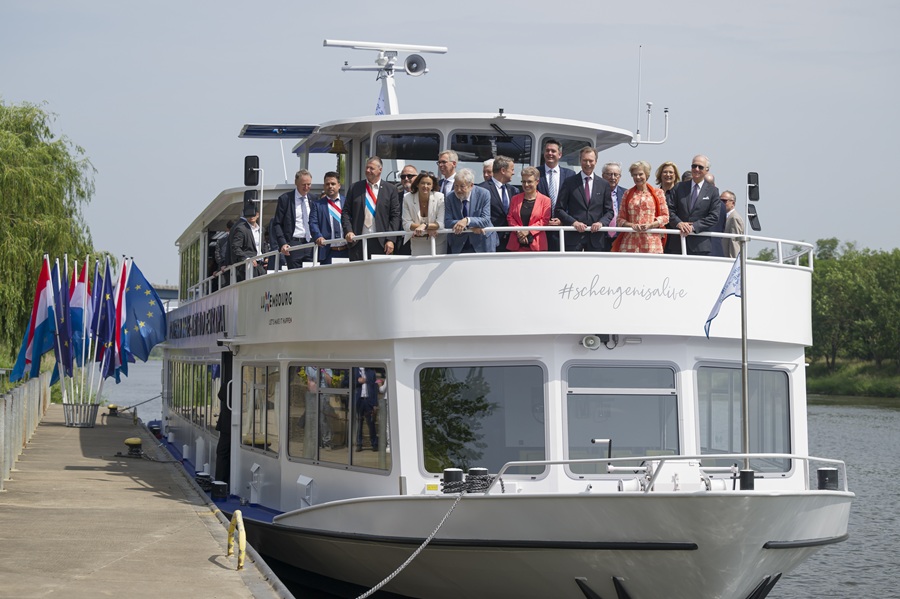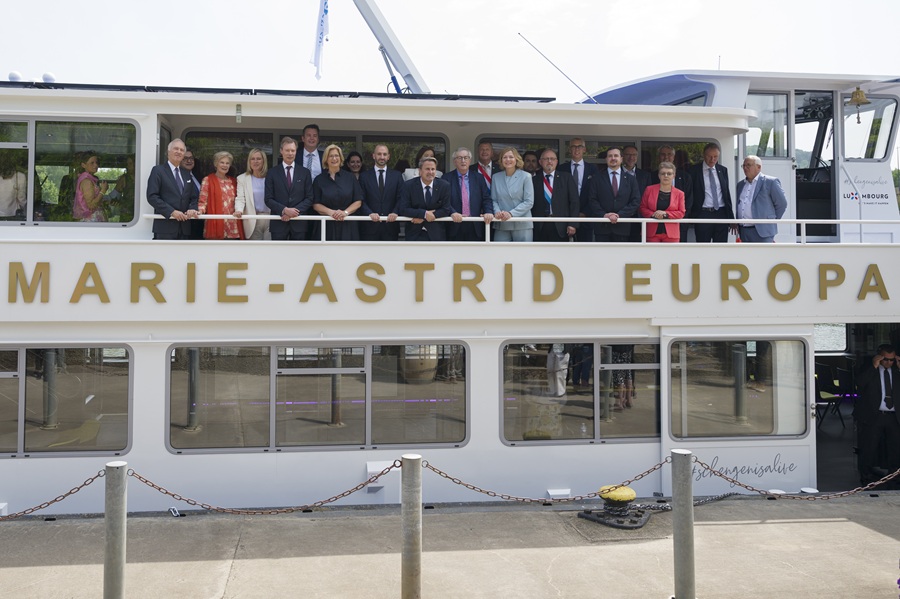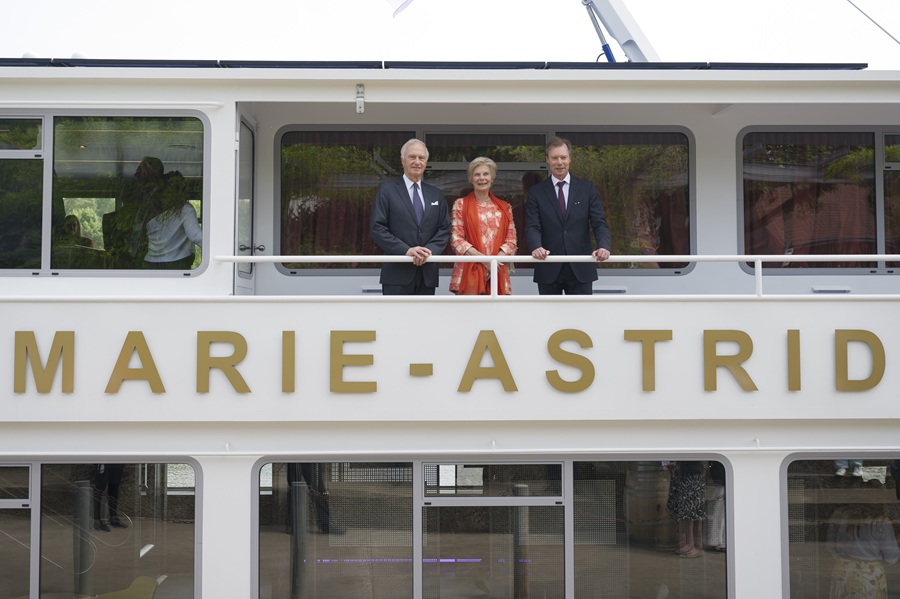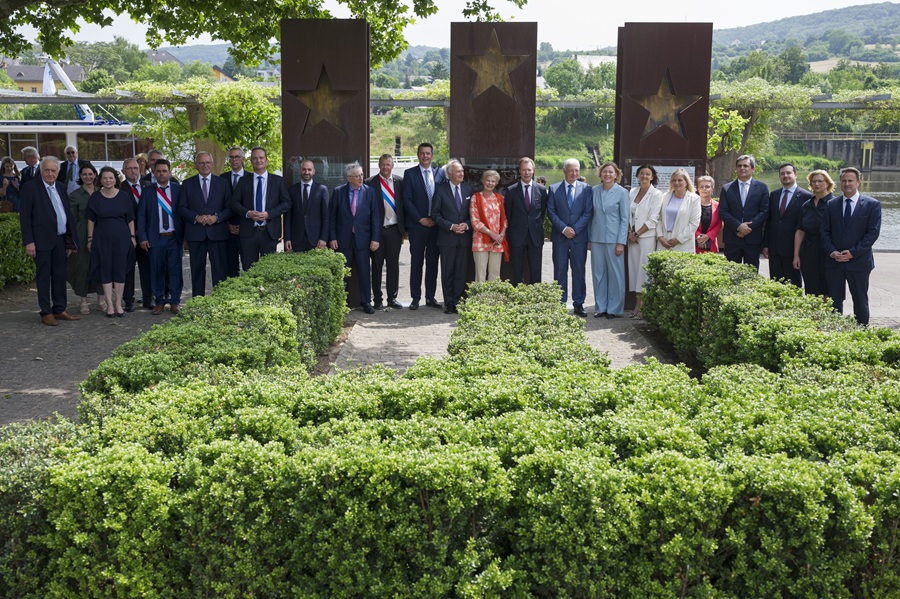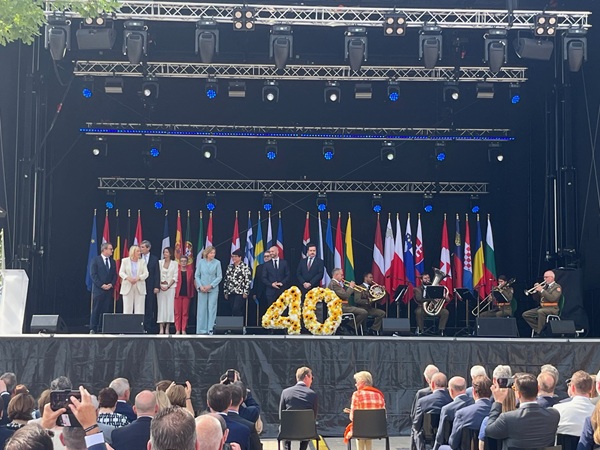 (front, L-R): Grand Duke Henri, Archduchess Marie-Astrid of Austria; (on stage): Deputy PM Xavier Bettel with the other speakers;
Credit: Chronicle.lu
(front, L-R): Grand Duke Henri, Archduchess Marie-Astrid of Austria; (on stage): Deputy PM Xavier Bettel with the other speakers;
Credit: Chronicle.lu
On Saturday 14 June 2025, the town of Schengen in south-east Luxembourg was the location of the 40th anniversary of the signing of the Schengen Agreement; on 14 June 1985, five countries - Belgium, France, (West) Germany, Luxembourg and the Netherlands - signed the agreement in Schengen as it borders both France and Germany.
40 years later and the Schengen Area now comprises 29 countries - 25 EU Member States and four non-EU countries: Iceland, Norway, Switzerland and Liechtenstein - with Bulgaria and Romania the most recent to join, earlier this year.
On Thursday evening an official dinner was held on board the Princesse Marie-Astrid tourist / gastronomic cruise ship during a trip from Grevenmacher to Schengen, for the Ministers of the Interior of the Schengen Member States; on Saturday, the official 40th anniversary celebrations were held, starting off in front of Schengen Chateau which is adjacent to the Schengen European Museum.
Grand Duke Henri was in attendance, as were Archduchess Marie-Astrid of Austria (elder sister of Grand Duke Henri) and Archduke Carl Christian of Austria.
In addition to members of the Grand Ducal family, Luxembourg was represented by Deputy Prime Minister, Minister for Foreign Affairs and Foreign Trade and Minister for Development Cooperation and Humanitarian Affairs, Xavier Bettel, the Minister of the Economy, SME, Energy and Tourism, Lex Delles, the Mayor of Schengen, Michel Gloden, and the President of Luxembourg's Parliament, Claude Wiseler, amongst others.
Other European dignitaries included representatives from Belgium, France, Germany, Kosovo, Slovenia, Montenegro, Cyprus, Romania and Bulgaria, representing a mix of original Schengen Area members, recent members and also candidate members.
Following the arrival of the members of the royal family, the newly renovated Europe Museum in Schengen was then officially opened by the Grand Duke, with a symbolic lifting of the entry barrier, followed by a brief tour by the museum director, Martina Kneip.
The official opening then moved to the adjacent Place des Etoiles for formal speeches in front of around 300 invited guests, with ambassadors Joanne Olivier (United Kingdom) and Jean McDonald (Ireland), representing countries outside the Schengen Area.
Michel Gloden, Mayor of Schengen, spoke in Luxembourgish, French, German and English, and welcomed everyone, referencing the vision that was initiated 40 years ago. He talked about the Schengen Agreement being a milestone of European integration. He concluded by looking ahead that the Schengen Agreement should stand for a beacon of hope and unity for the next 40 years and beyond.
Xavier Bettel, Deputy Prime Minister, also talked in multiple languages. He recalled growing up and experiencing being able to study and work abroad, and that many young people grow up today without understanding Luxembourg’s border crossings at Sterpenich, etc. He also talked about the European Union and the Single Market, emphasising the freedom to live, travel, work and trade without borders.
Sabine Verheyen, First Vice-President of the European Parliament, spoke in English and said she was happy to be at the birthday parry of the SCA, building bridges between countries. She talked about growing up in Aachen (in Germany, close to Belgium and the Netherlands) in a border area and cars being searched when crossing from one country to another, and the “non-existing freedom of families”.
Henna Virkkunen, Executive Vice-President of the European Commission responsible for Technological Sovereignty, Security and Democracy, spoke in English and recalled the vision 40 years ago which became reality into a “true European project” which “has become a cornerstone of our European identity”. She added that “the European Commission remains truly committed to reinforcing the Schengen Agreement”.
Anke Rehlinger, President of the Bundesrat, Minister-President of the Saarland, spoke in German and welcomed the 40th anniversary of the signing of the original Schengen Agreement in 1985.
Donika Gërvalla-Schwarz, Deputy Prime Minister and Minister of Foreign Affairs and Diaspora of the Republic of Kosovo, spoke in English in German and talked about the idea that transformed into reality 40 years ago. She said that, since 2024, Kosovan citizens have been able to experience the same freedoms as other Europeans.
Tanja Fajon, Minister of Foreign Affairs and European Affairs of the Republic of Slovenia, spoke in English and recalled Slovenia joining the European Union and three years later joined the Schengen Agreement. She has also some bitter memories in relation to discussions on the reform of the Schengen Agreement when internal border controls have been addressed.
Ervin Ibrahimović, Deputy Prime Minister and Minister of Foreign Affairs of Montenegro, spoke in English and stressed the benefits of the Schengen Agreement. He added that while his country is currently a EU candidate country, it is already a member of the Schengen Area. He referenced Luxembourg being a small country but one that has a strong voice.
Emil Hurezeanu, Minister of Foreign Affairs of Romania, talked in English and French, and recalled signing the accession agreement to the EU 20 years ago in Schengen. He also recalled those before us who fought so much for European values.
Nikolay Pavlov, Deputy Minister of Foreign Affairs of the Republic of Bulgaria, spoke in English and referred to his country’s joining the Schengen Agreement. He stressed security, a cornerstone of the Schengen Agreement, being a shared responsibility.
Bernard Quintin, Minister of Security and the Interior of the Kingdom of Belgium, spoke in French and talked up being able to travel and work in different countries throughout Europe without needing to produce ID cards, etc.
Vanessa Matz, Minister of Public Action and Modernisation, responsible for Public Enterprises, the Civil Service, State Real Estate Management, Digital Affairs and Scientific Policy of the Kingdom of Belgium, spoke in French and stressed the importance of the occasion for Belgium, and being able to live together without borders.
Benjamin Haddad, Minister Delegate for Europe of the French Republic, was the last to speak, in French, and talked about open borders, referencing the past 40 years and also looking ahead.
After the playing of the Luxembourg national anthem and Beethoven’s 9th Symphony, the European Anthem, by a five-piece army brass band, the celebrations then moved to the quayside for the inauguration of the renovated and renamed “Prinzessin Marie-Astrid Europa” ship by Princess Marie-Astrid of Luxembourg - who inaugurated the ship in traditional way by breaking a bottle of crémant across its bow - and the Mayor of Schengen, followed by a guided tour of the ship.
After the formal ceremonies had concluded, the public were then admitted, with the area decked out for a festival, with many stalls offering food and drink in a carnival atmosphere, with temperatures approaching 30C.
